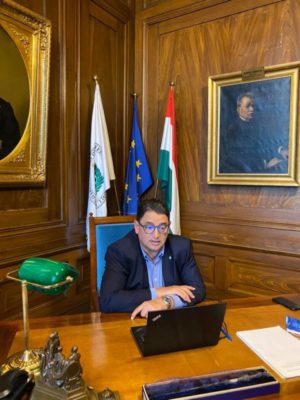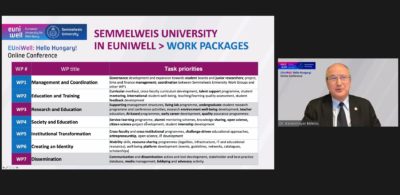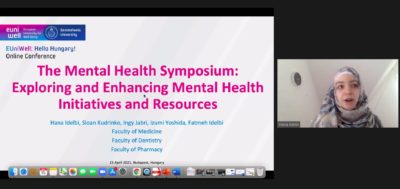Semmelweis University organised EuniWell: Hello Hungary! online conference on 15 April 2021 to showcase Semmelweis University’s activities and to discuss the future of European higher education. Dr. Miklós Kellermayer, Dean of the Faculty of Medicine introduced Semmelweis University’s role in the university alliance and spoke about the opportunities it offers to students, researchers and staff. The event was opened by Dr. Béla Merkely, Rector and László Palkovics, Minister for Innovation and Technology greeted the participants in a video message. In addition to presentation of winning research projects of the Second Seed Funding Call, a roundtable discussion was held with international experts from European universities.
 The EuniWell: Hello Hungary! online conference organized by Semmelweis University was opened by dr. Béla Merkely, Rector, who pointed out the changes European higher education is undergoing at the moment, which has been accelerated by the pandemic. He emphasized the importance of alliances like EUniWell set up as part of the European Universities Initiative, which are at the forefront of this transformation. 11 Hungarian universities, including Semmelweis University are members in such alliances.
The EuniWell: Hello Hungary! online conference organized by Semmelweis University was opened by dr. Béla Merkely, Rector, who pointed out the changes European higher education is undergoing at the moment, which has been accelerated by the pandemic. He emphasized the importance of alliances like EUniWell set up as part of the European Universities Initiative, which are at the forefront of this transformation. 11 Hungarian universities, including Semmelweis University are members in such alliances.
“EuniWell is a European alliance that provides a unique opportunity for Semmelweis citizens to empower research, education and to generate new knowledge and a wider range of experience.”
said dr. Béla Merkely.
He highlighted that research and education at Semmelweis University has always been closely intertwined and the university has now become a regional center of excellence in medicine and life sciences. He highlighted that research and education at Semmelweis University has always been closely intertwined and the university has now become a regional center of excellence in medicine and life sciences. As a result of closer cooperation between the seven partner universities participating in EuniWell, a variety of training and research collaboration opportunities as well as new forms of mobility will be available, he added.
 After dr. Merkely’s speech dr. László Palkovics, Minister for Innovation and Technology addressed the participants of the conference in a video message. He mentioned that the Hungarian government is committed to developing a university centered innovation system that in turn enhances competitiveness and a growth in sustainable economic development. Minister Palkovics also added that a high number of Hungarian higher education institutes play a major role in setting up networks as part of the European Universities Initiative. 11 Hungarian higher education institutions are members in 41 university alliances, that have been granted a project support, which is an outstanding achievement in this region. Dr. Palkovics also pointed out that Erasmus+ is one of the most successful programmes of the European Union. Its funding appears to have doubled over the period between 2014-2020, thus enabling more opportunities.
After dr. Merkely’s speech dr. László Palkovics, Minister for Innovation and Technology addressed the participants of the conference in a video message. He mentioned that the Hungarian government is committed to developing a university centered innovation system that in turn enhances competitiveness and a growth in sustainable economic development. Minister Palkovics also added that a high number of Hungarian higher education institutes play a major role in setting up networks as part of the European Universities Initiative. 11 Hungarian higher education institutions are members in 41 university alliances, that have been granted a project support, which is an outstanding achievement in this region. Dr. Palkovics also pointed out that Erasmus+ is one of the most successful programmes of the European Union. Its funding appears to have doubled over the period between 2014-2020, thus enabling more opportunities.
“I am convinced that this partnership holds many benefits for our colleagues and students”, added dr. Palkovics.
Dr. Beatrix Busse, Vice-Rector of the University of Cologne and EUniWell’s Chief Development Officer gave a brief summary of the project’s goals and plans. She talked about the goal of creating a real cross-border European university run at several campuses simultaneously, which is strongly dependent on student participation. The university will operate along several thematic work packages, covering areas such as innovative pedagogy, virtual and physical mobility, joint degrees and educational programs.
“Research development will be one of the focal points, as all seven universities are strongly research centered. To this end, EuniWell has launched a its Seed Funding Call financed by the alliance’s own funds and which has awarded 16 projects out of 104 with grants”, dr. Beatrix Busse.
 Dr. Miklós Kellermayer, Dean of the Faculty of Medicine and project leader of the EUniWell working group at Semmelweis University talked about the recent activities of the initiative.
Dr. Miklós Kellermayer, Dean of the Faculty of Medicine and project leader of the EUniWell working group at Semmelweis University talked about the recent activities of the initiative.
In 2020 EUniWell started a unique Seed Funding Programme that is intended to support small projects in collaboration with the consortium members. So far, in the two rounds of the EUniWell Seed Funding Call, six educational and research projects have been selected for funding, with Semmelweis University as a collaborating partner. Shortly after the opening session, the award winning projects were introduced.
The University of Nantes will have a leading role in the project called ’Discovery of the entrepreneurial ecosystem of the EUniWell consortium’s members’, which was granted funding during the first Seed Funding call. Using knowledge, exchange and dissemination of different university practices as a leverage, it aims to establish networks within a specific field. The next project on the schedule ’Good Practices Symposium on Student Well-being’ led by Leiden University aims to give teachers and students of the four participating universities the best tools to improve student well-being and encourage inter-institutional experience sharing.
The following projects have been funded in the second round of the Seed Funding call this spring:
 Hana Ibelbi, Sloan Kudrinko and Ingy Jabri, students of the Faculty of Medicine and Faculty of Dentistry are project leaders of The Mental Health Symposium: Exploring and Enhancing Mental Health Initiatives and Resources, a fruitful result of a unique initiative launched by a large number students. The purpose of the Mental Health Symposium is to emphasize the importance of mental health awareness. It is a topic more relevant than ever in light of pandemic’s impact on mental health. The COVID-19 pandemic has exposed current students to many new and unforeseen challenges including quarantine isolation, online courses and remote examinations. Many students experienced mental health related concerns such as anxiety, depression, panic, and loss of interest. EUniWell offers a unique opportunity to explore the effects of COVID-19 and improve the current mental health status of all students.
Hana Ibelbi, Sloan Kudrinko and Ingy Jabri, students of the Faculty of Medicine and Faculty of Dentistry are project leaders of The Mental Health Symposium: Exploring and Enhancing Mental Health Initiatives and Resources, a fruitful result of a unique initiative launched by a large number students. The purpose of the Mental Health Symposium is to emphasize the importance of mental health awareness. It is a topic more relevant than ever in light of pandemic’s impact on mental health. The COVID-19 pandemic has exposed current students to many new and unforeseen challenges including quarantine isolation, online courses and remote examinations. Many students experienced mental health related concerns such as anxiety, depression, panic, and loss of interest. EUniWell offers a unique opportunity to explore the effects of COVID-19 and improve the current mental health status of all students.
Well-beIntercomprehension, a joint project realized together with the University of Florence also raises an important question. Intercomprehension is a form of written or oral communication in which a person uses his or her own language and understands that of the other. Intercomprehension does not eliminate the need to study languages, but it does enable people to understand related languages quickly and adopt strategies so others can understand them more easily. Intercomprehension trains people to communicate across linguistic boundaries, so they can interact closely to enhance global and regional well-being: socially, economically, and culturally. In her talk Dr. Katalin Fogarasi, head of Department of Languages for Specific Purposes emphasized that the project offers a great opportunity to increase expertise during an internship at European universities and clinics and during treating foreign patients in Hungary.
The ’MaterialWell’ project, led by the University of Nantes aims to build a research and innovation network in the field of material sciences involving 21 departments and over 40 researchers from all seven partner universities of EUniWell. One of the key priority areas of Materials Science related to social well-being is medical innovations aiming to improve quality of life, such as injectable bone strengtheners to avoid invasive operations, dental implants that are affordable and non-toxic, long-life batteries for pacemakers to avoid the need for replacement surgery. MaterialWell believes in leveraging existing expertise: it connects all seven EUniWell partners, builds and strengthens its network to create a collaborative Material Sciences ecosystem. It promotes partnerships, research and will organize educational and training programs. On behalf of Semmelweis University, Dr. Csaba Dobó-Nagy represents the university with the research project of mapping the latest developments in dentistry. MaterialWell is a one year project with a ten year vision.
The project presentations were followed by a roundtable discussion on the future of European higher education with special focus on the concept and potential benefits of the European Universities Association. The participants of the roundtable discussion included Dr. Tibor Navracsics, Former European Commissioner for Education, Culture, Youth and Sport, Károly Czibere, Chairman of the Board of the Tempus Public Foundation, Dr. József Betlehem, Vice-Rector of the University of Pécs and professional head of the European Universities Alliance, EDUC, Dr. Beatrix Busse, Vice-Rector for the University of Cologne and Chief Development Officer of the European University for Well-Being, Amel Anane, Chief Student Officer of the European University for Well-Being and Dr. Bence Stubnya Vice-President of the Doctoral Student Board at Semmelweis University. The moderator of the roundtable discussion was Dr. Miklós Kellermayer.
The participants agreed that the European Universities Alliances are expected to have significant positive effects on the European Higher Education Area. Participation in the university alliances significantly increases the opportunities of Hungarian universities through knowledge transfer and the establishment of strong international connections, independent of their involvement in these consortia. These collaborations may have a positive effect on the institutions’ ranking positions, which is very much needed, as European institutions have not been listed among the top 20 leading universities in the world since Brexit. By facilitating mobility, these initiatives provide opportunities for international knowledge transfer and promote research, development and innovation. The European universities of the future must serve not only science and education, but social well-being as well and must educate professionals, who believe in common European values and are dedicated to contributing to development at an institutional, national and European level. In general, EUniWell may contribute to the twofold European goal of the universities’ responsibility in pursuing excellence and the realization of strategic social goals.
EuniWell, the European University for Well-Being is a European university alliance created made up of Semmelweis University, Leiden University, Linnaeus University, the University of Birmingham, the University of Cologne, the University of Florence and the University of Nantes, including more than a quarter million students and 36,000 researchers, educators and university staff. Its mission is to improve the quality of life of university citizens and Europeans by providing cross-border learning opportunities and creating international interdisciplinary research and education projects.
Tamás Deme, Eszter Turopoli – Directorate of International Relations
Photo: Attila Kovács – Semmelweis University (earlier photos and featured image); Department of International Relations
Translation: Ágnes Raubinek, Norbert Lukács